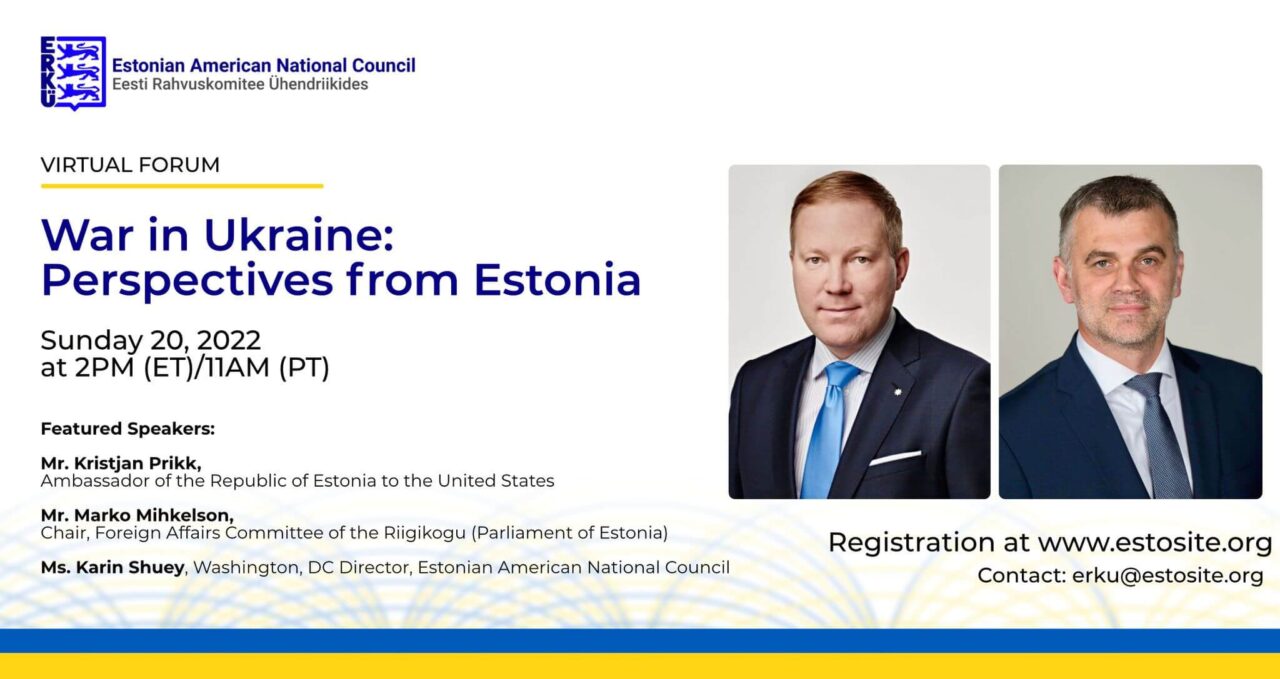Several events in recent days have featured Estonian government officials sharing their views on the situation in Ukraine and security in the region. A summary of each, including video links to the recorded versions of the events, follows.
On March 17, the three Chairs of the Foreign Relations Committees in the Parliaments of Estonia, Latvia, and Lithuania were called to testify in a hearing held by the Commission on Security and Cooperation in Europe (CSCE). Also known as the Helsinki Commission, the CSCE is an independent commission of the U.S. government, made up of nine members from the United States Senate, nine members from the U.S. House of Representatives, and one member each from the Departments of State, Defense, and Commerce. The hearing was titled “The Baltics Under Pressure”. Riigikogu Foreign Affairs Committee Chairman Marko Mihkelson represented Estonia.

The two-hour hearing covered many aspects of the deteriorating security situation in Europe brought on by Russian dictator Vladimir Putin’s invasion of Ukraine, which has destroyed the international framework that has kept the peace in Europe since 1945. Some key points included the need for more robust NATO presence in the Baltic countries, increased private investment in the region from the West, and truly open transatlantic trade through U.S. legislation and U.S. investment in the Three Seas Initiative (3SI), a platform for improving digital, energy, transportation, and infrastructure connections among twelve EU Member States located between the Baltic, Adriatic and Black Seas (see 3seas.eu for more information on 3SI). The full hearing is available at www.csce.gov/international-impact/events/game-changer.
On March 18, the same committee chairs were invited to the Atlantic Council for a forum on Baltic Perspectives on Russia. The participants discussed their meetings in Congress, including with leaders in the Senate Foreign Relations and Appropriations Committees and the House Foreign Affairs Committee, where they noted strong bipartisan support for security issues related to the region. They also discussed the broader war against the democratic system and how security has been built in Europe since the end of the Cold War. The video of this event is posted at www.atlanticcouncil.org/event/baltic-perspectives-on-russia.
The Estonian American National Council hosted a webinar “War in Ukraine: Perspectives from Estonia” on March 20 with Chairman Mihkelson and Estonian Ambassador to the U.S. Kristjan Prikk. Over 170 Estonian Americans and friends tuned in to hear about the situation in Estonia as it relates to the war in Ukraine and what the Estonian government is doing to help. They reported that Estonia has already sent $250 million in military assets to Ukraine, which is about one-third of Estonia’s defense budget. The audience was assured that friends and family in Estonia are safe and that there is no problem in planning travel to the country this summer. EANC Washington, DC Director Karin Shuey also gave a presentation on what EANC has done so far in support of Ukraine and what Estonian Americans can do to help in terms of advocacy, participating and sharing information locally, and some options for making donations to organizations with good connections on the ground in Ukraine. Please visit https://tinyurl.com/EANCUkraineVideo to watch the entire one-hour discussion.
On March 22, the Embassy of Estonia hosted a Fireside Chat: “European Security after Ukraine” featuring Secretary-General of the Ministry of Foreign Affairs of the Republic of Estonia and former Ambassador to the U.S. Jonatan Vseviov. Other panelists included General Philip Breed-love, former commander of NATO and Maryland National Guard Adjutant General Tim Gowen, who leads the National Guard State Partnership Program between Maryland and Estonia. The discussion was moderated by former Ambassador to NATO Kurt Volker. Major themes included acknowledging that there are still many possible scenarios that could play out in Ukraine, Russia, Europe, and transatlantic security as a result of this war and that they range from positive to catastrophic. How NATO and Europe behave now will determine European security for generations to come. There was agreement that the West needs to express more resolve in what it is willing to do rather than what it’s not willing to do; the former shows strength and is not provocative while the latter shows weakness and could provoke further escalation.
Karin Shuey
Washington, DC Director
Estonian American National Council
www.estosite.org
Get real time updates directly on your device, turn on push notifications.

















Monument to the 1944 Great Flight Opened in Pärnu